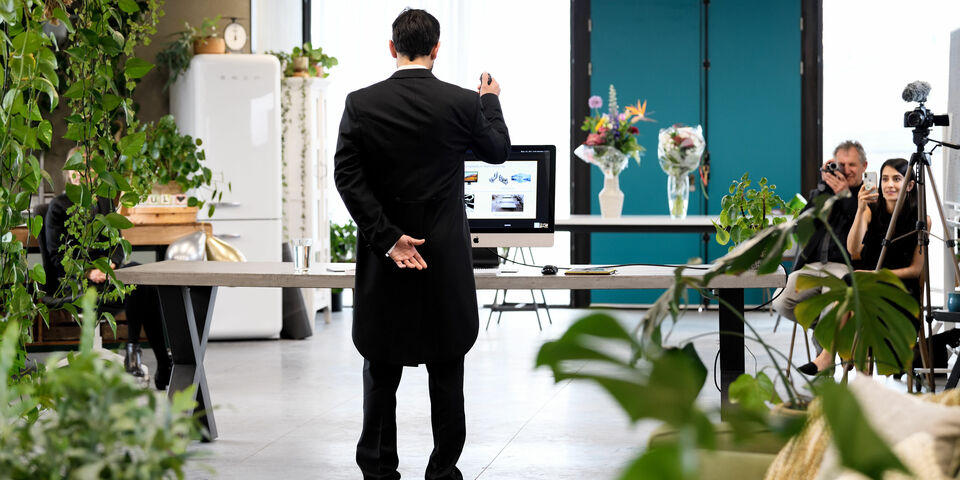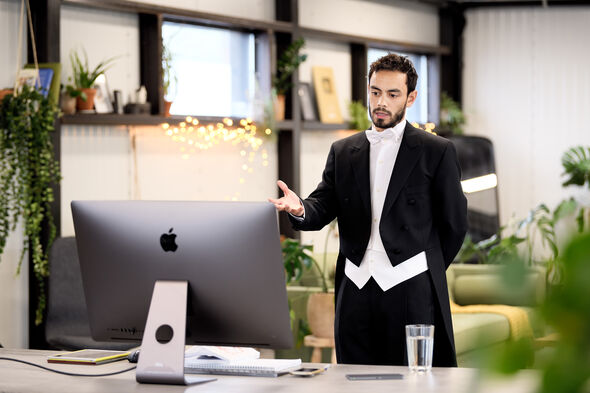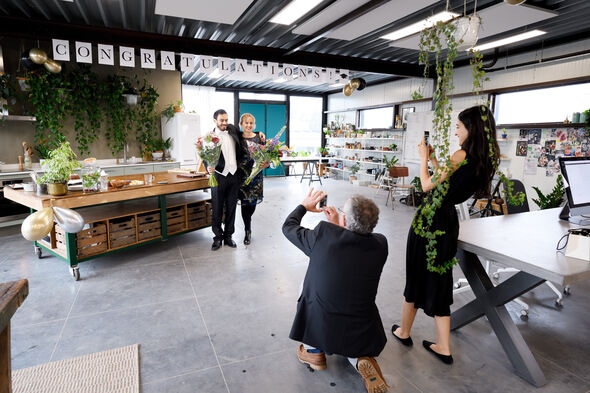Online defense: “In spite of everything it was a very festive occasion”
For more than five months the date April 28th, 2020 had been heavily ringed on his calendar, a focus for thoughts and expectations about how the day would go. When Tuesday afternoon came, Robin de Rozario (Control Systems Technology) defended his thesis not in a large hall surrounded by colleagues, friends and family, and a fitting ceremonial display, but via Skype, remotely. And, although he wasn't obliged to, he wore formal attire, tails. “For a touch of the ceremonial, in spite of everything.”
Actually, De Rozario had assumed that his defense would be canceled when on March 25th TU/e announced that all events scheduled before June 1st would be postponed. Planned PhD defenses would be held only in exceptional cases, with the dean's explicit approval, and digitally, was the emphatic message.
However, this researcher soon realized “that postponement was a choice rather than a requirement”. After having serious doubts, a period of wait-and-see and one sleepless night, in early April he settled the matter in his own mind and, with the dean's permission, decided to take the digital defense route. A choice between two evils, says De Rozario, and ironically it was uncertainty itself that became the deciding factor. “I could not imagine that a session in all its original glory could be held anytime soon, with a large audience, and followed by a stupendous party.”
And so, here he is on this Tuesday afternoon, in full regalia, standing at a desk talking to this own computer screen. Not, incidentally, in his living room but in the studio being leased by his girlfriend's company, which runs a food and wellness channel on YouTube with a focus on a vegetarian lifestyle. “It is practically our second home, the place where we spend most of our time, in fact.”
Public lecture
In this setting De Rozario holds the customary public lecture via Skype, intended for the large audience that is noticeably absent this afternoon - with the exception of his parents and girlfriend. Over the past years, the PhD candidate has been working on the theory of self-learning systems. More specifically, his focus has been the development of an alternative approach to the mathematical models needed by many existing technologies before they can even start to learn; models that require considerable human expertise and to which inaccuracy poses a constant threat. De Rozario has developed a “safe and dummy-proof algorithm” based not on mathematical models, but which makes smart use of the data produced during the learning process.
After a rather rocky try-out, as the researcher describes it, with a helpful colleague earlier that day, the presentation goes “nicely, actually”. He has to adjust to having to ask for each new slide (not De Rosario himself but someone else is in charge of proceedings) and, initially, there is an audio issue to iron out, in all likelihood a feedback loop between his own microphone and speakers.
Having little or no sight of the doctoral committee members during the presentation also feels rather awkward, De Rozario tells after the event; their screens at the foot of this own screen are small and, moreover, to give a fast connection to whoever is speaking, most video and audio connections are broken as necessary. “The camera image of one committee member froze at the outset; that makes it difficult to converse normally. You can't help but miss the hand gestures and other body language that people often use.”
Hora est
But, as the researcher says, “The time flew by”. After exactly an hour there is no sound of a traditional beadle's mace stamping the floor, but one of the committee members does speak the customary words, ‘hora est’. The committee withdraws to deliberate and recalls the doctoral candidate to the digital meeting to hear their decision and receive congratulations.
Thus, the defense itself is not that different in its online form, “although it did relieve the pressure knowing that an audience of eighty wasn't listening.” Having said that, De Rozario does miss having an audience: “I always thought it would be a huge challenge to stand my ground before a large audience”. There was no live stream for people keen to follow the proceedings: “Because I am one of the first digital candidates, it was decided to keep things as simple as possible.” His presentation has been recorded, however, and the researcher will soon be sharing a compilation of moments on YouTube.
No rollercoaster
De Rozario can look back on a successful afternoon, with fewer nerves that he had expected. Although he does say that he missed not being able to hold a defense ‘in person’, “mainly because it means you can't bring your years of study to a close with a big finale. Normally, this day would be a rollercoaster of events and emotions, and it would culminate in a beast of a party.”
By wearing a dress suit De Rozario says he wanted “to create something of the ceremonial ambiance, in spite of everything” and to uphold some of the symbolism and tradition. The committee members might not have been in academic robes (“of course they don't keep a set at home”), but they were “nicely turned out in a suit; I really appreciated that”. What's more, his girlfriend had “gone to a lot of effort and made a dinner with I don't know how many courses, and there were flowers, so in spite of everything it was a very festive occasion. Really, I don't feel I've missed out on anything.”
In the coming period, De Rozario plans “to do some small projects of my own that I've had to put on the back burner for ages.” But, corona crisis or not, he will also be keeping an eye on the job market. “I've already had some leads from people keen to point out available positions. So I'm not worried, there are options, but I'm not in any hurry.”





Discussion